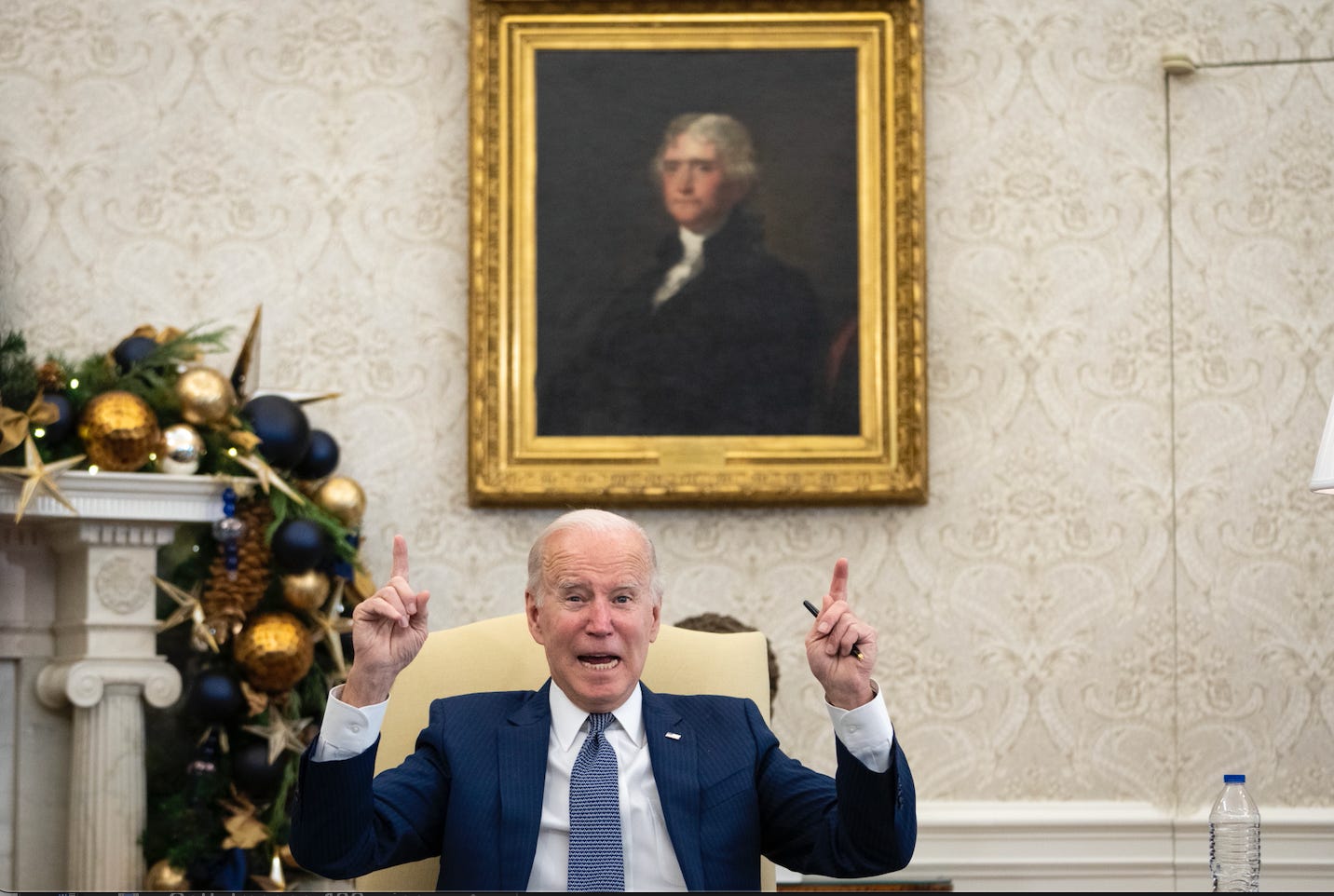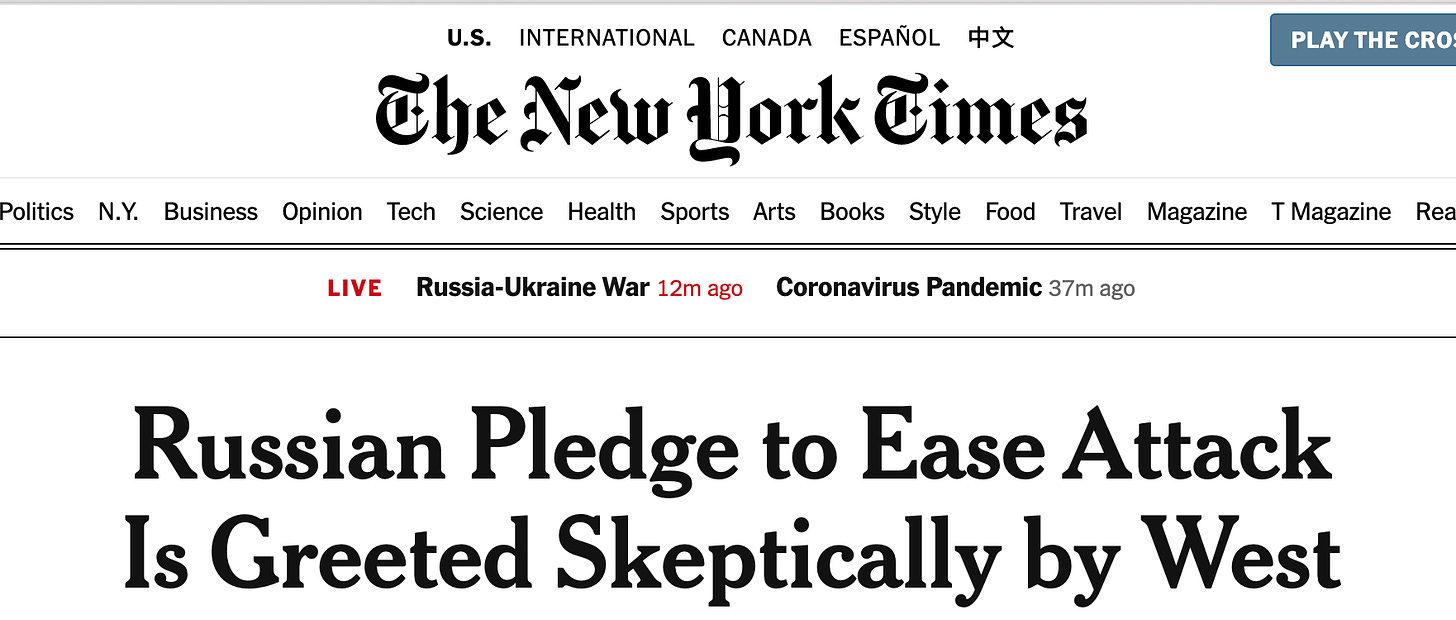"Regime Change" Doesn't Work, You Morons
How many examples of "regime change" blowing up in our faces do we really need before realizing that it's a disastrous policy? Will we really try it with a nuclear-armed adversary?
| 891 |
Not long ago, candidate Joe Biden’s most troubling behavioral tendency was the surprise outburst of belligerence. Campaigning, he’d challenge questioners to push-up contests, jam fingers in the sternums even of supporters, and plunge into rambling monologues about leg hairs and chain-fights.
Now, the president’s face is often a mask of terror, like a man unsure of how he came to be standing in the middle of an intersection. Mental cars racing past, he met the press Monday, to clarify a statement made last week about Vladimir Putin: “For God’s sake, this man cannot remain in power.” Many interpreted this as a call for regime change. Not at all, Biden said, reading from a large-print cheat sheet — this reportedly happened — that reminded him to say he was merely expressing “moral outrage,” and “not articulating a change in policy.” When he ran out of pre-prepared remarks, he drifted back to danger, saying:
It’s more an aspiration than anything. He shouldn’t be in power.
The AP writeup offered help: “He said he was expressing an ‘aspiration’ rather than a goal of American foreign policy.” (I’m sure nuclear-armed Putin appreciated the semantic difference). When Biden moved more toward candor, saying he made “no apologies” for his remarks, another reporter quickly tried to guide him back to a safe harbor:
Q: Your personal feelings, sir? Your personal feelings?
THE PRESIDENT: Personal. My personal feelings.
Biden even offered his Princess Bride/Vizzini-esque analysis that “the last thing I want to do is engage in a land war… with Russia”:
Although administration mouthpieces Tony Blinken and Jen Psaki scrambled to reassure a nervous world that the U.S. is not intent on “doing regime change” in Russia, officials everywhere have been telling reporters the opposite on background.
This cat was out of the bag weeks ago. As Joe Lauria at Consortium points out, Biden was asked on February 24th, at the start of the invasion, what sanctions would accomplish if they hadn’t prevented war. His answer:
No one expected the sanctions to prevent anything from happening. That has to sh- — this is going to take time. And we have to show resolve, so he knows what’s coming and so the people of Russia know what he’s brought on them. That’s what this is all about.
Biden said virtually the same thing in Brussels last week:
Sanctions never deter… The maintenance of sanctions, the increasing the pain … we will sustain what we’re doing not just next month, the following month, but for the remainder of this entire year. That’s what will stop him.
We heard this more explicitly from Boris Johnson on March 1st, “The measures we are introducing, that large parts of the world are introducing, are to bring down the Putin regime,” Johnson said. Lauria points out this was two days after British Armed Forces Minister James Heappey wrote in the Telegraph that “His failure must be complete… the Russian people empowered to see how little he cares for them. In showing them that, Putin’s days as President will surely be numbered… He’ll lose power and he won’t get to choose his successor.”
Jen Psaki’s non-committal answer to The Intercept’s question about whether or not Volodymyr Zelensky has autonomy to negotiate the end of sanctions, and the apparent disinterest of the United States in participating in peace talks, also speaks to this. Biden’s many “gaffes” on the subject have all let slip military or strategic initiatives, not diplomatic ones, like revealing that the U.S. is training Ukrainian troops in Poland.
As Jacobin’s Branko Marcetic noted, Blinken even went out of his way to throw cold water on supposed positive news coming out of Russia-Ukraine negotiations. The Secretary of State said he hadn’t seen any signs of “constructive” progress, and any indication that Moscow might be willing to pull back might be to “deceive people and deflect attention.” Even the New York Times vaporized a headline that briefly appeared Tuesday suggesting progress in negotiations.
This is the before shot:
And this is the “very shortly after” shot, hours later:
Things could change at any moment. Biden could suddenly pivot to helping Zelensky secure a diplomatic solution. But as of this writing, evidence suggests the United States is not interested in a settlement, and is gunning for a long-term play that would unseat Putin, crack the Sino-Russian alliance, and reverse the political malaise that’s beset neoliberal democracies for years, with one Rumsfeldian “big move.”
Well, you say, so what? Shouldn’t America use the occasion of Putin’s seemingly disastrous and indefensible invasion to try to force him out of power?
Sure, that makes sense. Except for two things.



No comments:
Post a Comment